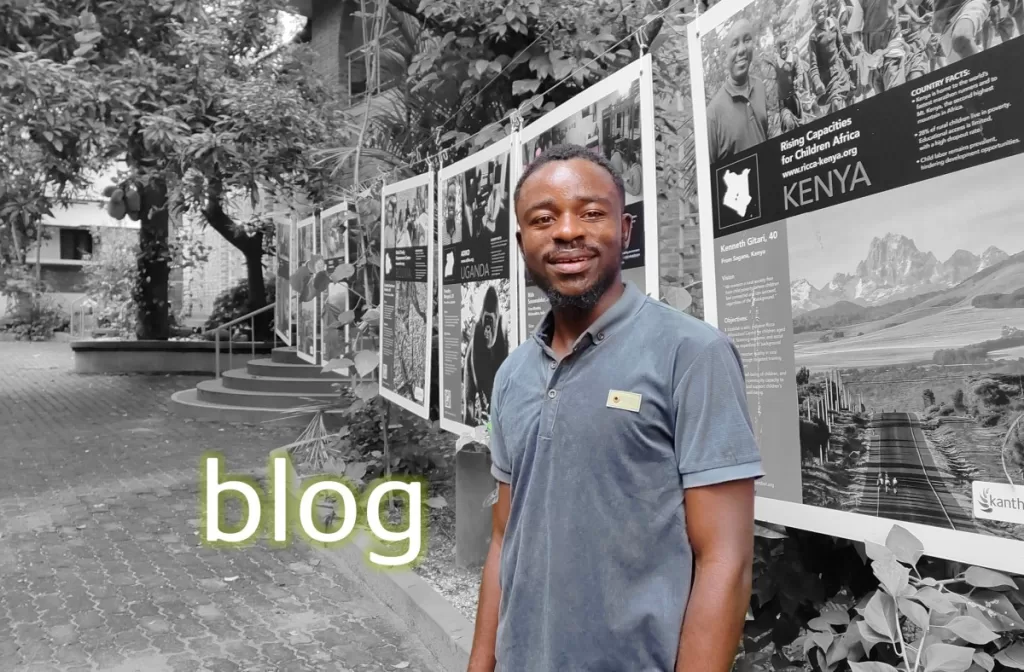kanthari blog – Alfred Ngulo – Tanzania
That day, my body became a broken compass spinning in pain, directionless, beneath a mango tree. I had tried to walk, but my legs had turned to water and my sight to fog. Just as I surrendered to the silence, a stranger appeared and gave me a second chance. Set a path that would lead me to fight the disease that had almost stolen my future.
I grew up in Kindimba Juu, a beautiful small village surrounded by hills and rivers winding through the fertile land. My parents were farmers, growing maize and beans. We lived in a small mud house with a thatched roof and just two rooms. Kindimba Juu was dotted with small water pools, and mosquitoes were thriving. Malaria was a constant shadow in our lives. I would hear the word in nearly every household conversation, especially during the rainy season. My mother often said, “In this village, malaria isn’t a question of if, it’s when.” We knew little about prevention, and our only hope was the small local dispensary when someone fell sick.
I still remember when my 13-year-old cousin came down with malaria. He shivered violently, vomited for days, and grew weaker with each hour. His parents believed he had been bewitched and took him to a traditional healer. Shortly after arriving, he fainted for three hours. Before they could take him to a hospital, it was too late. He died before ever seeing a doctor. The entire village mourned him.
At the age of 10 years, I left the village and moved to Lindi to pursue my secondary education. My boarding school was surrounded by ponds, and combined with the warm climate, it created an ideal environment for mosquitoes to breed. The mosquito nets we had were old and torn, offering little protection.
One morning, I woke up dizzy, with a pounding headache and trembling hands. I hoped the symptoms would pass, but the pain only worsened. I knew it was malaria. The nearest health center was more than an hour away, and with no guardian or transport, I began to walk alone.
After thirty minutes, my legs weakened. My vision blurred. I collapsed beneath a mango tree beside the road to the farms, drenched in sweat and shivering. I lay there for nearly three hours. Eventually, a stranger found me. He asked, “Why are you sleeping under this mango tree?” In a faint voice, I replied, “I’m too dizzy to walk. I need to get to the hospital.” He lifted me onto his bicycle and slowly pedaled me to the nearest clinic. When he found out my parents couldn’t afford the treatment, he took me to his home and cared for me until I recovered. I owe my life to his kindness.
During my four years in secondary school, I contracted malaria over ten times, even during national exams. Sitting in class with dizziness, headaches, and shivering felt like a daily habit.
Fortunately, things began to change when I moved on to high school, which was in a colder climate with fewer mosquitoes. My teacher encouraged me to submit a project idea for a national science competition. The memories of battling malaria came flooding back. I was determined to find a solution that could help protect my community from this suffering. I began researching plants with mosquito repellent properties, reading scientific papers, articles, and speaking to doctors.
Lemongrass was identified as one of the most effective natural repellents. I extracted its oil and created a prototype mosquito repellent that could protect against mosquito bites for up to eight hours. I presented my project at the national scientific conference and won. From that moment on, I knew I had found my passion. I studied vector control and founded a business for organic mosquito repellents. Through this, I want to offer vulnerable communities access to effective malaria prevention.
Driven by my struggles and my passion for empowering vulnerable communities, I came to kanthari to gain the skills, vision, and network needed to expand my impact so that no child collapses alone, and no parent loses a child to a preventable bite.
Read more kanthari blog posts on: https://www.kanthari.org/coronablog/



